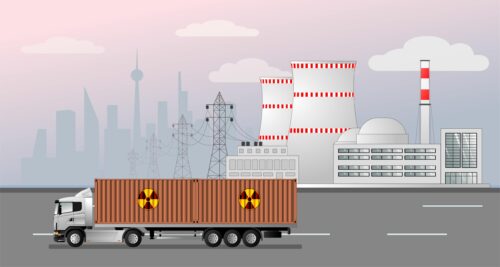Frontier Technology Corporation (FTC) is a leading supplier of californium-252 (Cf-252), a powerful neutron source often used as fuel for nuclear reactors. Nuclear fuel is capable of producing and sustaining heat energy through nuclear fission. Since nuclear fuel has a finite amount of energy generation ability and remains hazardous even after it’s used, it is important for nuclear facilities to have a safe and reliable disposal option. In this blog, we will address the characteristics of spent nuclear fuel and how it can be safely managed and disposed of.
What is Spent Nuclear Fuel?
Spent nuclear fuel is nuclear material that has been irradiated for fission reactions until it can no longer generate sufficient heat to provide nuclear power. With more than 96 operating nuclear reactors in power plants across the U.S., approximately 2,000 metric tons of nuclear waste is generated annually. Although this may seem like a high number, the U.S. has only generated approximately 83,000 metric tons of radioactive waste since the establishment of nuclear power plants in 1958. When you consider the amount of power generated by nuclear power plants in that time, the amount of waste is quite small, particularly when compared with the amount of waste produced by traditional fossil fuel power plants.
What Happens to Spent Nuclear Fuel?
Spent nuclear fuel is shipped to one of 76 nuclear storage facilities located across 34 U.S. states. Shipping casks for nuclear fuel are specifically engineered to withstand a variety of accidents, including water immersion, fire, impact, and punctures. Upon arrival at the storage facility, the used fuel is kept in secure steel and wep filled containers, eliminating the risk of leakage or contamination throughout the shipping and storage process. In fact, thousands of shipments of depleted nuclear fuel have been transported safely across the U.S. for more than 5 decades without any harm to the environment or the public.
Although nuclear waste in the U.S. is typically stored in these secure facilities, several countries, including France, Germany, Japan, and Switzerland, recycle used nuclear fuel into new power sources. Since more than 90% of the potential energy of nuclear fuel still remains when it is discarded after 5 years of use in a reactor, recycling the material is a logical and efficient solution.
In addition to established recycling methods using uranium mixed oxide, a variety of new reactor designs are in the works that could help U.S. facilities make better use of used nuclear fuel.
New research has also shown that californium-252 (Cf-252) may become an integral part of radioactive fuel recycling. Its ability to interact with and start a chain reaction separating different elements coupled with its resistance to damage from radiation may make it a viable option for future nuclear recycling operations.
Depleted Neutron Source Return Program at Frontier Technology Corporation
In spite of the dangers presented by the radioactive nature of nuclear waste, there are a number of established methods for the transport, storage, and recycling of used nuclear materials, which can include Cf-252 neutron sources. Often used as a means of starting chain reactions in nuclear power plants, Cf-252 is highly radioactive and must be safely disposed of once it has been depleted.
At FTC, we understand the importance of safe handling and disposal of neutron sources, particularly Cf-252. As one of the world’s only suppliers of Cf-252, we consider it our responsibility to ensure that our customers have an accessible means of safely disposing of their depleted neutron sources. To make it as easy as possible, we have developed a fee-free disposal program that allows customers to return their depleted sources to FTC in a manner that is compliant with stringent regulatory guidelines. It is our goal to ensure that our customers can safely and easily dispose of their depleted neutron sources at any time, without laborious procedures or prohibitive fees.
To learn more about californium-252, our return program, or our portfolio of other services and capabilities, reach out to us today.

